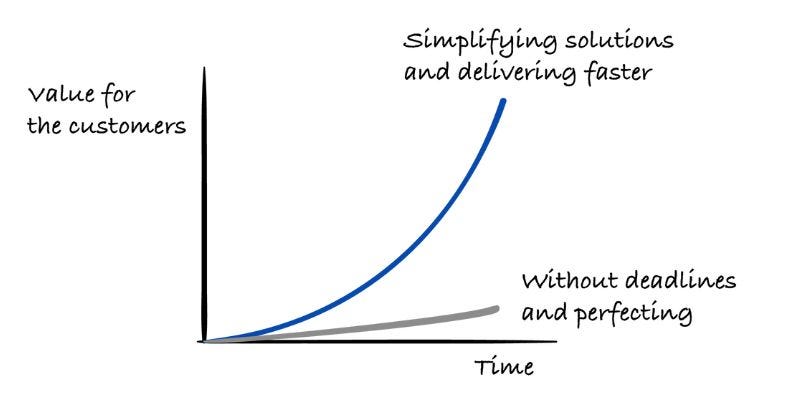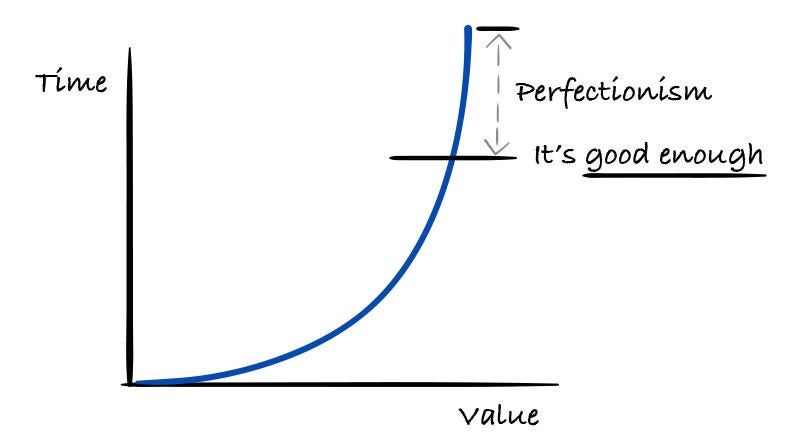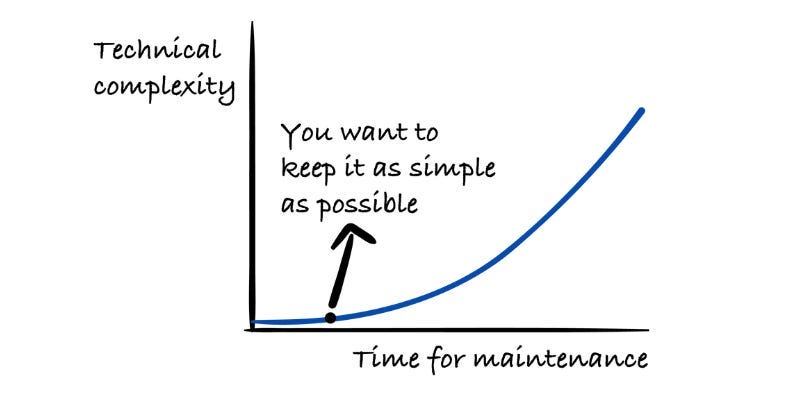Deadlines Are Not So Bad, I’ll Tell You Why
Deadlines are not so bad, I’ll tell you why #
Excerpt #
Simplifying the solutions and adjusting the scope is the way to go!
[

Senior Engineer to Lead: Grow and thrive in the role (ready for enrollment) #
I am happy to share that the online cohort course called “Senior Engineer to Lead: Grow and thrive in the role” is now ready for enrollment!
[

]( https://maven.com/gregor-ojstersek/senior-engineer-to-lead?promoCode=EARLYBIRD)
The course is primarily for Senior Software Engineers who wish to grow to the Lead role (Team Lead, Tech Lead (Staff), Engineering Manager).
I am happy to welcome ambitious Software Engineers and I would be happy to welcome everyone in the lead role who wishes to thrive in the role as well!
I’ll be sharing with you all of my experience both as an engineer who grew to the Team Lead role and beyond + as a manager who has promoted a lot of engineers to lead roles!
As readers of my newsletter, you are the first to receive the chance to sign up + I have prepared a special EARLYBIRD discount for you.
Use code EARLYBIRD for 25% off or use this link: Senior Engineer to Lead where the code is already applied.
Let’s get back to this week’s thought.
Intro #
Deadlines have gotten quite a negative perception over the years in the engineering industry. But if they are done in the right way, they can be incredibly useful!
In this article, we will go through what to do and what not to do when it comes to deadlines + why deadlines can be an extremely effective tool for focus.
Let’s start with what not to do when it comes to deadlines.
Engineers dread when they hear the word deadline, why is that? #
Well, if you have a negative experience with something in the past, you will automatically have negative thoughts when that particular thing appears the next time.
And that’s the reason why a lot of engineers dread when it comes to deadlines. They had a negative experience with it.
I had a fair share of such experiences both as an engineer and a middle manager. These are 3 examples that I’ve experienced the most:
- The deadline has been set without a specific reason about “why”.
I remember one time when I was a middle manager, I just received an email saying that this particular thing needed to be delivered by that particular time, without any explanation of “why”. I needed to rally up my teams and find a way to accomplish that.
- The deadline has been set without even communicating.
I accidentally found out that there was a deadline set on a particular project that I was owning, but that was not communicated to me. You can imagine my surprise when that deadline was totally unrealistic by the efforts that we predicted.
- The deadline has changed without expecting that the scope will change as well.
Right, this happened as well. Expecting that the solution can just magically be delivered a lot sooner with the same amount of people or within the same scope.
But what if the deadlines are done in the right way? Let’s get into that next.
Deadlines done in the right way are actually very helpful #
There are a lot of different pros when it comes to deadlines, here are my top 3 reasons why deadlines are very helpful:
- Deadlines help us to not try to perfect our solutions.
“Work expands so as to fill the time available for its completion.”
— Parkinson’s law
And if the work expands to the time available, we will be “perfecting” our solution until we reach the end of the time.
[

And perfectionism is one of the biggest productivity killers in our industry and it can cause quite a delay to the project. But not only that, it can also leads us to burnout.
I’ve found myself trying to “perfect” my solutions SO many different times and when I set deadlines for myself, I focus a LOT more on progress and forget about being “perfect”.
You can read more about perfectionism in the article: Biggest productivity killers in the engineering industry (paid article).
- We focus a lot more on simplifying the solutions.
Simplifying is the way to go in our industry. One of the best things I like to see is a simple solution to a complex problem. That really makes my day.
Simple means it’s easy to understand, easy to change, easy to maintain. That helps us to move fast and make adjustments if needed.
[

In the current fast pace world where a lot of businesses are changing things very frequently, keeping things simple will provide immense value.
You can read more in the article: Simplifying as much as possible is the way to go in the engineering industry (paid article).
- Reduce unnecessary complexity (scope is variable, not time).
With the deadline, we set one of the constraints, which removes the variability and helps us to make decisions easier.
I really like what Mike wrote in yesterday’s LinkedIn post.
It makes it easier to make decisions because you’ve removed a variable. I turn the question around to “What can we do with the time we have available?”
— Mike Thornton
I rather have the scope to be variable and time to be fixed #
It shifts your mindset not to perfect, but rather to simplify and deliver value to the customers faster.
Delivering the value to the customer faster means that customer satisfaction will rise and the NPS (net promoter score) will rise as well, which will help us to get more customers and that means that the business will also grow faster.
What’s really important to understand is that we as engineers, are here to deliver as much business value as possible.
If there is a business reason to deliver by a specific time, the best thing we can do is to look to simplify and reduce the scope, which will help us to reduce unnecessary complexity.
And only if that’s not possible, the second thing should be to negotiate the timeline - always keep this in mind.
This is how setting the deadline helped us to deliver the MVP of the mobile app at Zorion #
We were focusing on getting the mandatory license for our business for quite some time and that was one of the biggest bottlenecks for us.
We didn’t know what exact timeline we could anticipate + it was always shifting based on the feedback we were getting from relevant regulators.
That wasn’t great because we couldn’t exactly plan for our release and without active customers, we were building features and adding additional complexity to the codebase.
With every complexity you add, it takes some time to make sure that it works exactly the way it is intended.
So when we finally got close to the finish line of acquiring the license, we started to shift our mindset from adding new features to making sure that everything works correctly and is aligned with our operational efforts and also everything is compliant with the standards.
So that’s where I defined a timeline (deadline) for us to achieve that. I knew that we could infinitely perfect everything and keep on “adjusting” things and that would happen if there was not a timeline attached.
I knew how important it is for the business that we deliver the app as soon as we can and this was the way to achieve that.
The app is never going to be perfect and processes are never going to be 100% aligned.
As long as we are solving the customer’s problems and can do everything needed to achieve that, we are good to go.
If you are interested in investing in pre-IPO stocks like SpaceX, Canva, OpenAI to name a few, you can check our app here: App Store, Google Play Store.
So, what to DO when it comes to deadlines? #
The #1 thing you can do when it comes to deadlines is to embrace them. Try to understand what is the business reason behind it and how is achieving that deadline going to help the business.
The #2 thing is to focus on adjusting the scope and not the time. This will automatically put your mind into simplifying and avoid unnecessary complexity.
And the #3 thing is to focus on good communication. Make sure to continuously provide updates regarding the project and ensure that everyone is on the same page. I advise over-communication for the start (especially in remote environments) and after some time you can adjust based on what you see is working and not.
If you are the one who is defining the deadlines here are my top 3 suggestions:
- Be transparent as much as possible
Share all the info about the “why” and make sure that you are available for any questions. Providing the context and a good reason is what is going to make the deadline effective and is going to resonate with the people responsible.
- Most effective deadlines are the ones that we set ourselves for ourselves (if possible)
Knowing this, just asking the specific person or a team to provide a timeline for completing the project is a great way to put some time constraints on the project. Especially for a team.
That’s also the reason why I believe sprint goals are so effective. They really help with the focus on building the RIGHT things and ensure alignment between teams and also the business.
- Make sure to write it down somewhere, hold people accountable and check the progress continuously
If you think that setting a timeline is going to magically make things happen, that’s not the case.
It’s really important to write down the agreements in a place that is easy for everyone to see + set up frequent check-ins. That is going to help a lot to avoid any misunderstandings.
Last words #
When it comes to deadlines, many different words describe them, like target dates, commitments, etc. The difference is more or less in the interpretation.
All can mean the same or can mean a totally different thing.
If you take one thing from the article, that is to:
“Perceive any set of timelines positively and with curiosity and look for ways to reach them by reducing the scope.”
Liked this article? Make sure to 💙 click the like button.
Feedback or addition? Make sure to 💬 comment.
Know someone that would find this helpful? Make sure to 🔁 share this post.
Whenever you are ready, here is how I can help you further #
Book a Coaching and Mentoring or Consulting and Advising call with me here.
Interested in sponsoring this newsletter? Check the sponsorship options here.
Get in touch #
You can find me on LinkedIn or Twitter.
If you wish to make a request on particular topic you would like to read, you can send me an email to info@gregorojstersek.com.
This newsletter is funded by paid subscriptions from readers like yourself.
If you aren’t already, consider becoming a paid subscriber to receive the full experience!
Check the benefits of the paid plan
You are more than welcome to find whatever interests you here and try it out in your particular case. Let me know how it went! Topics are normally about all things engineering related, leadership, management, developing scalable products, building teams etc.